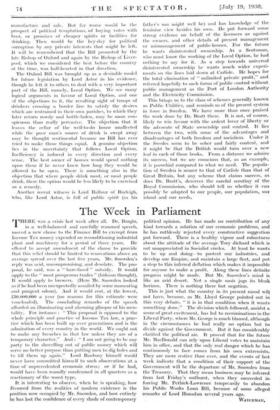The Week in Parliament
THERE was a crisis last week after all. Dr. Burgin, -I- in a well-balanced and carefully reasoned speech, moved a new clause to the Finance Bill to exempt from Income Tax money expended on reconditioning industrial plant and machinery for a period of three years. He offered to accept amendment of the clause to provide that this relief should be limited to renovations above an average spread over the last live years. Mr. Snowden's reply was acid, uncompromising, and desolate. The pro- posal, he said, was a " bare-faced " subsidy. It would apply to the " most prosperous trades " (hideous thought). It would apply to brewers. (Here Mr. Snowden looked as if he had been unexpectedly assailed by some nauseating and pungent odour). And it would cost, at the lowest, £30,000,000 a year (no reasons for this estimate were vouchsafed). The concluding remarks of the speech afforded an illuminating and alarming glimpse of his men- tality. For instance : " This proposal is opposed to the whole principle and practice of Income Tax law, a prac- tice which has been built up over generations and is the admiration of every country in the world. We ought not to make any breaches in that law unless they are of a temporary diameter." And : " I am not going to be any party to the shovelling out of public money which will serve no better purpose than puttingmen to dig holes and to lill them up again." Lord Banbury himself would never have committed himself to such observations at a time of unprecedented economic stress; or if he had, would have been roundly condemned in all quarters as a reactionary of the worst type.
It is interesting to observe, when lie is speaking, how divorced from the realities of modern existence is the position now occupied -by Mr.. Snowden, and how entirely he has lost the confidence of every shade of -contemporary
political opinion. He has made no contribution of any kind towards a solution of our economic problems, and he has ruthlessly rejected every constructive suggestion put forward. There is a healthy vigour and robustness about the attitude of the average Tory diehard which is not unappreciated in Socialist circles. At least he wants to be up and doing—to protect our industries, and develop our Empire, and maintain a large fleet, and put a stop to this infernal deflation which makes it impossible for anyone to make a profit. Along these lines definite progress might be made. But Mr. Snowden's mind is like an arid desert. Not a single oasis jags its bleak horizon. There is nothing there but negation.
This is just what the country in its present mood will not have, because, as Mr. Lloyd George pointed out in this very debate, " it is in that condition when it wants something done." The division which followed, amidst a scene of great excitement, has led to recriminations in the Liberal Party, where Mr. George is much blamed, although in the circumstances he had really no option but to divide against the Government. But it has considerably clarified the political air. It proved that for the future Mr. MacDonald can rely upon Liberal votes to maintain bins in office, and that the only real danger which he has continuously to face comes from his own extremists. They are more restive than ever, and the events of last week indicate that a condition of their support of the Government will be the departure of Mr. Snowden from the Treasury. That they mean business may be inferred from last Friday's outburst, when they succeeded in forcing Mr. Pethick-Lawrence temporarily to abandon his Public Works Loan Bill, because of some alleged remarks of Lord Hunsdon several years ago.
W4TCHMAN.
















































 Previous page
Previous page